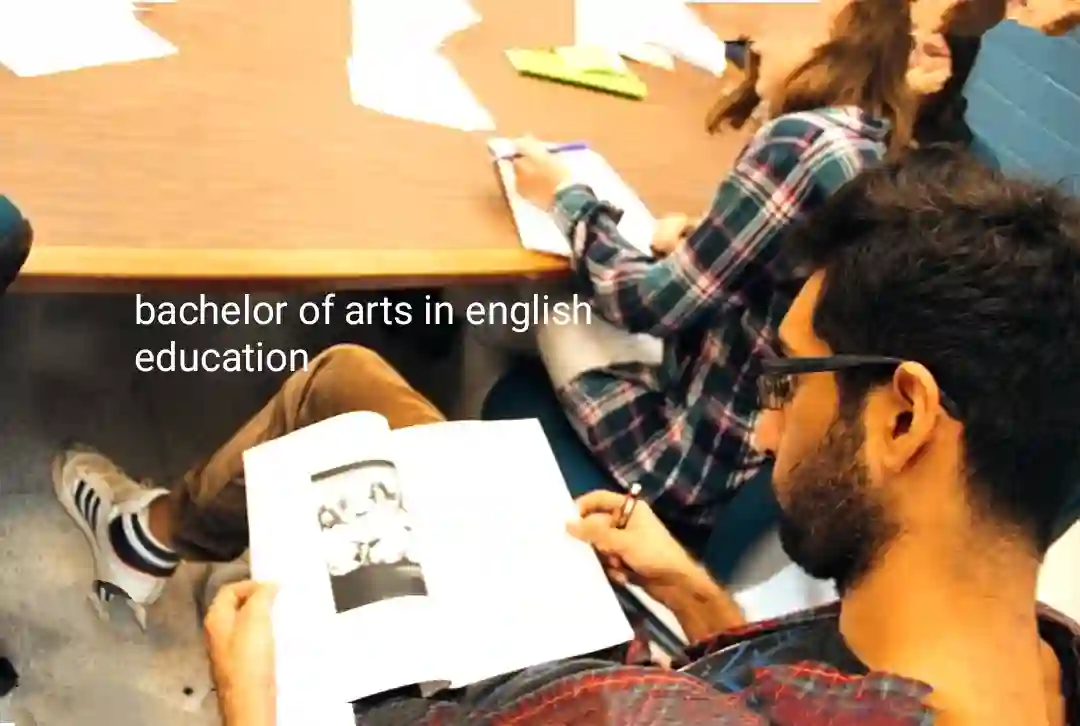Bachelor of Arts in English Education: Inspiring Minds, Crafting Stories

Introduction: The Power of English Education
Table of Contents
A Bachelor of Arts (BA) in English Education is more than just a degree; it is a gateway to shaping minds, inspiring creativity, and fostering a love of language in the next generation. This program merges English literature and language’s rich, expressive world with impactful, transformative teaching practices. Whether you dream of becoming a high school English teacher, a writer, or an educational content creator, a Bachelor of Arts in English Education offers you the tools to fulfill your passion and make a significant difference.
In this blog post, we’ll explore the ins and outs of pursuing a Bachelor of Arts in English Education. We’ll dive into what the program entails, the skills you’ll develop, the career paths that await, and how the degree contributes to personal growth and social change. Let’s take a journey into the rewarding world of English education.
What is a Bachelor of Arts in English Education?
A Bachelor of Arts in English Education is a four-year undergraduate program that combines the study of English language, literature, and composition with the theory and practice of teaching. This degree prepares students not only to understand the intricacies of the English language but also to impart that knowledge effectively to others. It focuses on various topics, including classic and contemporary literature, linguistics, writing skills, and pedagogical methods for teaching language arts.
The aim is to develop subject matter expertise and the teaching skills necessary to inspire young learners. Graduates of this program are often equipped to work in middle and high schools as English teachers. Still, they also have the flexibility to pursue careers in curriculum design, educational consulting, tutoring, or even publishing and content writing roles.
Core Components of the Degree
- Literature Studies
Literature is at the heart of an English Education program. Students study everything from Shakespeare to contemporary works by authors from diverse backgrounds. Literature classes help future educators develop critical thinking, empathy, and a broad understanding of different cultures and perspectives. The exposure to classic and modern texts not only sharpens analytical skills but also prepares educators to foster a deep appreciation of literature in their students.
- Composition and Writing
Strong writing skills are a cornerstone of any English program. Throughout a Bachelor of Arts in English Education, students learn to write in various formats, from academic essays and creative fiction to persuasive texts and instructional guides. This emphasis on writing helps prospective teachers in their communication skills and understanding how to guide students through the writing process, encouraging them to express themselves clearly and effectively.
- Linguistics and Language Studies
A foundational understanding of linguistics is crucial for anyone teaching the English language. Courses in linguistics and grammar equip students with knowledge about the structure and function of language. This understanding helps future teachers explain complex concepts such as syntax, semantics, and phonetics in ways that make sense to young learners.
- Pedagogical Training
The teaching component of the BA in English Education introduces students to the art and science of teaching. Courses in pedagogy cover educational psychology, classroom management, lesson planning, and assessment strategies. The focus is on creating a dynamic and inclusive learning environment where all students feel valued and engaged.
- Student Teaching Practicum
A significant part of an English Education degree is hands-on experience from a teaching practicum or internship. During this period, students work under the supervision of an experienced teacher, applying their theoretical knowledge in real classrooms. This immersive experience is critical in developing confidence, adaptability, and a true understanding of being a teacher.
Skills Developed in the Program
- Communication Skills
English Education majors are trained in effective communication, both written and verbal. These skills are essential for classroom instruction and building relationships with students, parents, and colleagues.
- Critical Thinking and Analysis
Analyzing literature and constructing arguments are exercises in critical thinking. English Education students learn to evaluate texts, make connections across genres and periods, and engage in meaningful discussions—skills they pass on to their students to help them become independent thinkers.
- Creativity and Adaptability
Teachers need to be creative and adaptable to meet the diverse needs of their students. The BA in English Education encourages creativity through writing assignments, classroom activities, and literature interpretation. It also prepares future educators to adapt lessons to fit different learning styles and levels of ability.
- Empathy and Emotional Intelligence
Literature exposes us to various human experiences, allowing us to see the world from multiple perspectives. By immersing themselves in different narratives, English Education majors develop a strong sense of empathy, which is crucial for effective teaching. Understanding students’ emotional and intellectual needs is a vital part of the role of an educator.
Career Opportunities with a Bachelor of Arts in English Education
A Bachelor of Arts in English Education opens numerous career opportunities. Here are some of the most common paths graduates take:
- Secondary School English Teacher
The most common career for graduates is teaching English at the middle or high school level. As an English teacher, you can spark a love for literature and language in young minds. You’ll help students develop reading comprehension, critical thinking, and writing skills essential for their future academic and professional lives.
- Curriculum Developer or Educational Consultant
With their deep understanding of language and learning, some graduates choose to work in curriculum development, helping design educational programs and learning materials. Educational consultants often work with schools or companies to improve teaching practices and academic outcomes.
- Tutoring and Learning Centers
Many graduates work in tutoring centers or offer private tutoring, helping students who need additional support outside the classroom. This can be especially rewarding for those who enjoy working with students one-on-one and tailoring their teaching methods to meet individual needs.
- Content Writing and Publishing
The skills developed in an English Education program are also valuable in writing and publishing. Graduates may work as content writers, editors, or even authors. Their firm grasp of language, storytelling, and audience engagement makes them ideal candidates for these roles.
- Graduate Studies and Higher Education
For those interested in further specialization, pursuing a master’s degree in education, English, or a related field can lead to careers in higher education, research, or school administration.
The Personal and Societal Impact of English Education
Pursuing a Bachelor of Arts in English Education is not just a career decision. It is a commitment to making a difference. Teaching English is about more than grammar rules and book reports; it’s about helping students find their voices, understand different perspectives, and engage with the world critically and thoughtfully.
Fostering a Love of Learning
English teachers play a pivotal role in fostering a love of reading and learning. By introducing students to engaging texts and helping them see the relevance of literature to their own lives, teachers can light a spark that continues to burn long after students leave the classroom.
Promoting Cultural Understanding
Students are exposed to different cultures, periods, and worldviews through literature. This exposure helps promote empathy and understanding, breaking down barriers of ignorance and prejudice. English education, therefore, plays a vital role in creating more open-minded and culturally aware citizens.
Building Critical Thinkers
In a world filled with information and misinformation, thinking critically is more important than ever. English education teaches students to analyze, question, and draw evidence-based conclusions. These skills are not only academically valuable but are also essential in daily life and the workforce.
Challenges and Rewards of Becoming an English Educator
Challenges
Teaching is challenging. English educators often have to work with large and diverse groups of students, each with their strengths, weaknesses, and needs. Balancing curriculum requirements with students’ individual needs can be demanding. Additionally, grading papers and providing constructive feedback can be time-consuming and sometimes emotionally draining.
Rewards
Despite these challenges, the rewards of teaching English are immense. Few careers provide the personal fulfillment that comes from watching a student grow and succeed, knowing that you played a part in that journey. There is a unique joy in seeing a student finally “get it” understanding a complex poem or mastering the art of persuasive writing.
Is a Bachelor of Arts in English Education Right for You?
A Bachelor of Arts in English Education might be the perfect fit if you love literature, enjoy writing, and are passionate about working with young people. It’s a degree that requires dedication, patience, and creativity, but the rewards are substantial. Whether standing at the front of a classroom, penning educational materials, or mentoring students individually, you’ll impact the world.
Consider your interests and career goals carefully. Are you excited by the idea of discussing great works of literature? Do you feel energized by the thought of helping students develop their voices? Are you patient, adaptable, and empathetic? If the answer is yes, then a career in English education could be your calling.
Bachelor of Arts in English for secondary education
A Bachelor of Arts in English for Secondary Education is a degree program designed to prepare students to become middle or high school English teachers. This program typically combines a robust foundation in English literature, writing, and language studies with the pedagogical skills necessary to teach adolescents effectively. Here’s an overview of what you might expect from such a program:
Critical Components of a Bachelor of Arts in English for Secondary Education:
- English Language and Literature:
- Core English Courses: These courses cover various literature, including British, American, and world literature. You’ll explore different literary genres, critical texts, and the cultural contexts of significant works.
- Writing and Composition: Courses often include advanced writing, creative writing, technical writing, and rhetoric. Students develop strong analytical and communication skills that are crucial for teaching.
- Linguistics and Language Studies: Some programs include courses on linguistics, grammar, and the history of the English language, which provide a deeper understanding of the language’s structure and development.
- Educational Theory and Practice:
- Teaching Methods for Secondary Education: These courses focus specifically on teaching English to adolescents, including lesson planning, classroom management, and strategies for teaching reading and writing.
- Adolescent Development: Understanding the psychological and social aspects of adolescence is critical for effectively teaching students at the secondary level.
- Diversity and Inclusion: Programs often emphasize techniques for teaching in diverse classrooms and fostering an inclusive learning environment.
- Practicum and Student Teaching:
- Field Experience: Students usually participate in field experiences, such as observing classrooms and assisting experienced teachers. These practical elements help them connect theoretical knowledge to real-world classroom dynamics.
- Student Teaching: A primary requirement is a semester-long student teaching assignment, where you teach full-time under the supervision of a mentor teacher. This hands-on experience is essential for developing the confidence and skills to lead a classroom.
- Licensure Preparation:
- Many programs include coursework that prepares students for teacher certification or licensure in their state. This may involve preparing for exams like the Praxis, which are required in many regions.
Career Paths:
- Secondary School English Teacher: Graduates are primarily prepared to teach English literature and language arts to grades 6-12 students.
- Curriculum Developer: Some graduates may work on developing educational materials, lesson plans, or standards-aligned curricula for schools or academic publishers.
- Education Consultant: Graduates may also pursue roles that allow them to support schools in curriculum design, teacher training, or other educational improvements.
- Further Education: Graduates can also pursue a Master’s degree in education, English, or administration to advance their careers, becoming specialized educators or school administrators.
Skills Acquired:
- Critical Thinking and Analysis: A deep engagement with literary texts helps foster analytical thinking and the ability to interpret complex material.
- Communication: Focusing on writing, speaking, and teaching ensures that graduates are strong communicators—both in conveying subject matter and guiding and motivating students.
- Pedagogical Techniques: Graduates are skilled in designing practical lessons, assessing student progress, and adapting teaching methods to diverse learning styles and needs.
A Bachelor of Arts in English for Secondary Education is ideal for those passionate about literature and language and want to inspire young people. It provides the subject matter expertise and the teaching skills needed to be an effective and engaging educator.
Conclusion: Shaping the Future One Student at a Time
A Bachelor of Arts in English Education is more than just a degree—it’s an invitation to be part of the educational journey of future generations. It equips you with the skills to communicate effectively, think critically, and teach passionately. You’re shaping the future by choosing this path, one student at a time. Whether you’re fostering a love of Shakespeare or helping a student craft their first poem, your impact as an English educator is profound and lasting.
The path may not always be easy, but it is undoubtedly rewarding for those with a passion for language and a commitment to education. With every book you open, every discussion you lead, and every student you inspire, you’ll be making a difference that echoes far beyond the classroom walls.
>> The journal of criminal justice education
>> Tenses in english language grammar



